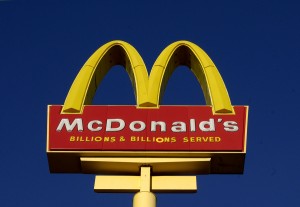This week, the minimum wage debate was been kicked in to overdrive after fast-food workers across the country began protests and former Massachusetts Republican Governor Mitt Romney argued in favor of increasing the minimum wage.
After months of policy debates and reports, will the United States government finally raise it to $10.10?
Not so fast, says Federal Reserve Chair Janet Yellen, who delivered testimony to Congress on Thursday in which she presented two sides to the minimum wage debate that economists often put forward: assisting those in poverty and the numerous consequences to business, especially in today’s fragile economy.
 Yellen refused to take a side on the matter, but she did support the Congressional Budget Office’s (CBO) report that warned President Obama’s plan would result in approximately half a million fewer jobs, something that wouldn’t bode well for a country that is suffering from a high unemployment rate.
Yellen refused to take a side on the matter, but she did support the Congressional Budget Office’s (CBO) report that warned President Obama’s plan would result in approximately half a million fewer jobs, something that wouldn’t bode well for a country that is suffering from a high unemployment rate.
The new Fed Chair said that how big an impact a minimum wage hike would have on the economy would require “considerable debate.” Yellen did say, however, that she wouldn’t argue with the CBO’s assessment because “they’re good at this kind of evaluation.”
In February, the non-partisan CBO published a report that explained that a minimum wage boost would lift close to one million workers out of poverty, but it would cost as many as 500,000 jobs. Despite most on Capitol Hill usually agreeing with the CBO on an array of issues, Democrats and the White House criticized the report and said it contradicts the viewpoints of many economists who say the minimum wage does not have an effect on employment.
“CBO’s estimates of the impact of raising the minimum wage on employment does not reflect the current consensus view of economists,” Jason Furman, the chairman of the White House’s Council of Economic Advisers, wrote in a WhiteHouse.gov blog post. “The bulk of academic studies, have concluded that the effects on employment of minimum wage increases in the range now under consideration are likely to be small to nonexistent.”
However, there have been numerous economists who have likened minimum wage laws to “compulsory unemployment,” such as Murray N. Rothbard, Milton Friedman, Thomas Sowell, Henry Hazlitt, Friedrich Hayek and several others. There are several arguments that they say can be made against the minimum wage:
- It hurts the unskilled, the uneducated, immigrants and youth
- Most minimum wage proposals are not based on any economic theory, model or premise
- Higher prices are the result of the minimum wage
- Qualifications of employment would enhance because companies are forced to pay higher wages
- Job losses because businesses would cut hours, reduce staff levels and perhaps automate the workforce
“It is obvious that the minimum wage advocates do not pursue their own logic, because if they push it to such heights, virtually the entire labor force will be disemployed. In short, you can have as much unemployment as you want, simply by pushing the legally minimum wage high enough,” wrote Rothbard in an article entitled “Outlawing Jobs: The Minimum Wage.”
Nevertheless, the American people are in favor of a higher minimum wage.
A Washington Post poll late last year discovered that two-thirds of Americans endorse a proposal to raise the minimum wage. A Gallup study found that more than three-quarters (76 percent) support increasing the minimum wage. Surveys have also shown that most Democrats, Republicans and Independents are in favor of hiking the minimum wage.



